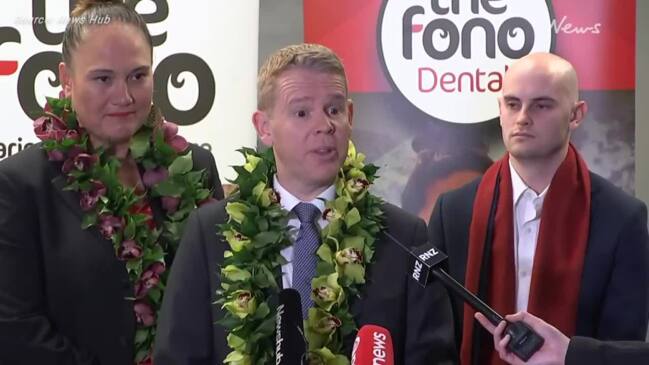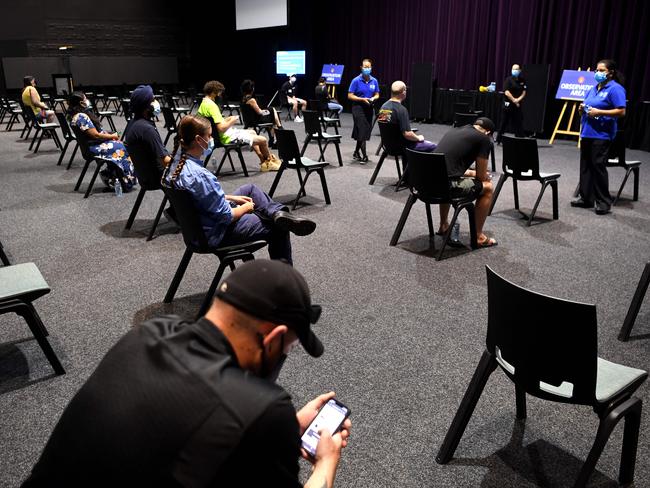‘Amplified pain syndrome’: Eleven-year-old boy’s horror diagnosis after Covid vaccine
A Victorian mum has revealed the little-known diagnosis that left her son “screaming” in pain and barely able to walk for a full year.

Illness
Don't miss out on the headlines from Illness. Followed categories will be added to My News.
The mother of an 11-year-old boy who suffered such a severe reaction to his Covid vaccine that he was sent home from hospital with highly addictive painkillers including oxycodone has slammed the “disgusting” treatment of her family by the government.
Alex, who asked not to use her real name to protect her son’s identity, says she was left “alone and isolated” caring for him for 18 months after he developed excruciating pain all over his body — which grew so intense he could barely walk or sleep and sometimes had to be carried to bed “screaming” — following his Pfizer vaccination in January last year.
Local GPs and doctors at their hospital in regional Victoria as well as specialists in Melbourne were left at a loss, unable to find the source of the boy’s symptoms, which would not respond even to powerful painkillers including oxycodone, gabapentin — used to treat nerve pain — and ketamine.
“The rheumatologist gave it an overall diagnosis of ‘diffuse amplified pain syndrome’, which is basically pain in the absence of causation or trauma — just blanket, unexplained pain,” Alex said.
“We stayed [in Melbourne] for a week while they ran so many tests — blood tests, pain specialists, rheumatologists, cardiac paediatricians, everything. He was put on so many drugs, so many painkillers. He was put on the highest dose of nerve medicine that he could have. He’s had two ketamine infusions. They gave him stuff to sleep at night because he’s got insomnia because he’s in so much constant pain.”
Discharge summaries provided to news.com.au show the boy, who was previously fit and healthy and enjoyed playing sports, was sent home from a Melbourne hospital last February on a cocktail of powerful medications.
“[Eleven-year-old male] presenting with diffuse pain post Covid vaccine on 21st January,” the notes read. “Reviewed by multiple GPs and ED — normal baseline bloods, normal troponins, normal ECGs and echo, no cardiac abnormality.”
The notes show he was reviewed by a pain consultant and started on medications, but the following day showed “little improvement” so the dosages were increased.
“Impression that ongoing physio will be beneficial to improve symptoms,” the summary said.

‘You don’t exist’
His symptoms barely improved for the rest of the year.
“It was nearly 12 months before he could walk like a normal person,” Alex said. “He didn’t go to school for the entirety of last year. He’s only now finally started to get better.”
Alex, who was ineligible for compensation under the federal government’s Covid Vaccine Claims Scheme, conceded “I haven’t got a letter that says this was caused by the vaccine”.
But she has no doubt it was linked.
“He had the injection at 2.30pm,” she said.
“I’ve got two other kids, they were both fine. By 5.30pm he had chest pain, headache, said he was dizzy and felt kind of sick. We’d been told that was kind of normal, to give him some Panadol and Nurofen. By the time he woke up the next day he was in a lot more pain, his joints were hurting, he was struggling to be physically upright because he felt so dizzy and nauseated, his chest pain was unbearable.”
Over the next few days he was hospitalised twice due to the unrelenting pain. The second time he was given “the painkiller that goes up your nose” — fentanyl spray — which “calmed him down”.
“They sent a 10-year old home with Endone [oxycodone] because he was in so much pain,” Alex said.
Alex said her family has spent thousands of dollars on medical bills “trying to fix him”, but did not qualify for National Disability Insurance Scheme funding or carer’s payments because he “technically wasn’t sick enough”.
She wrote to Prime Minister Anthony Albanese about her situation and in July last year received a letter back from a senior Health Department official. “At this stage, a causal link between Amplified Pain Syndrome and the Covid-19 vaccines has not been established and it is not listed in the Product Information document for the Pfizer Covid-19 vaccination,” the official wrote.
“As a result, Amplified Pain Syndrome is not a claimable condition under the Scheme.”
Alex has reported her son’s reaction both to the Therapeutic Goods Administration (TGA) and to Pfizer’s vaccine safety division, but has heard little back. “[When] you have a bad reaction they’re like, oh no, you don’t exist, and that’s the end of it,” she said.
“No one cares. You don’t exist. My child who was crippled doesn’t exist, his pain doesn’t exist. It’s disgusting.”

Diabetes link
Dr Rado Faletic, founder of Australian vaccine injury group Coverse, said many people still suffering felt abandoned by authorities.
“It’s now been well over two years of ongoing and debilitating conditions for many of the Australians who have suffered from a wide range of severe adverse reactions to their Covid vaccinations,” he said.
“There continues to be very little that doctors can do for many of these people, and most of them do not qualify for any form of government assistance, including the perversely narrow federal compensation scheme.”
Jane, 36, an Adelaide-based nurse who also asked not to use her real name due to her employment, developed type 1 diabetes two weeks after receiving her second Pfizer booster dose last July.
Two weeks after her vaccine she began to experience severe dry mouth, excessive thirst, abdominal pain and tiredness, worsening to diarrhoea, blurred vision, dizziness, chest pain and vomiting.
She was admitted to hospital where she was found to be in diabetic ketoacidosis. Blood tests confirmed a diagnosis of auto-immune diabetes, medical records show.
“I have no history of diabetes in my family,” she said. “I’ve now got a lifelong condition. The vaccine I suspect triggered it, I’m pretty sure it has, and I now have to take medications for the rest of my life.”
Jane said she had also been rejected by the Vaccine Claims Scheme despite providing a supporting letter from her endocrinologist, who cited “a number of case reports” published in medical literature of type 1 diabetes occurring after Covid vaccination.
“An up-to-date review suggests a plausible mechanism by which the vaccination may possibly cause type 1 diabetes,” the specialist wrote.
Jane said still the TGA insisted there was “no evidence”.
“There is,” she said. “Just because the majority of people don’t get side effects doesn’t mean they should be ignored, they’re severe. There was definitely not enough information given. I didn’t know about all these adverse events until I started researching.”
A spokeswoman for the TGA said the agency was unable to comment on individual cases.
“Diffuse amplified pain syndrome and type 1 diabetes have not been causally linked to Covid-19 vaccination in Australia or overseas,” she said.
Services Australia, which administers the compensation scheme, said as of August 31 it had received 3805 claims and paid out more than $11 million – 199 have been approved, 1625 are in progress, 729 withdrawn and 1252 deemed not payable.

Aussies ‘abandoned’
Dr Faletic, who blamed his own neurological reaction on the Covid shot in October 2021, added the pandemic was “definitely not over” for vaccine-injured Australians “as their lives remain in tatters after they took a vaccine that they were told was safe, wouldn’t cause any long-term harms, and that there’d be a financial safety net if they got injured”.
“This diverse group of Australians have been badly misled and abandoned by the Australian government, and they can’t understand why nobody in government health circles is doing a single thing to help them,” he said.
“Sadly, with every round of boosters rolled out by governments our support groups grow as people all over the world — who had no issues with their previous shots — suddenly find themselves disabled. They are understandably angry when they learn how many of us were injured previously and have not gotten anywhere with meaningful recognition or support from our governments.”
Last month, Anthony Albanese announced a 12-month inquiry into the federal government’s handling of the Covid pandemic.
But the Prime Minister was widely criticised for making it an inquiry, rather than a royal commission, and for excluding “actions taken unilaterally by state and territory governments” from the scope.
It’s unclear whether vaccine injuries will be included in the inquiry. The terms of reference include “key health response measures … for example across Covid-19 vaccinations and treatments”.
In New Zealand, there have been calls for the royal commission to look into issues including mandates and vaccine injuries.
“The royal commission can look at whatever it wants in regard to the Covid response,” Prime Minister Chris Hipkins told reporters last month. “Ultimately it’s a royal commission so it’s not my job to direct them.”
Dr Faletic pointed to the UK’s Covid inquiry, saying the inclusion of vaccine injury organisations there was “an important development for all Covid vaccine injured people around the world”.
“It is currently the only official public forum anywhere where those whose lives have been destroyed by the Covid vaccines can have their evidence presented publicly and without censorship,” he said.
A Covid vaccine injury class action lawsuit, filed against the Commonwealth government in April this year by Queensland GP Dr Melissa McCann, is slowly making its way through federal court.
A case management hearing is scheduled for December 4.

‘Benefits outweighs risks’
As of October 1, there have been 139,567 total adverse events reported to the TGA out of 68.74 million doses administered, a rate of 0.2 per cent.
“The most frequently reported side effects suspected to be associated with the vaccines include headache, muscle pain, fever, fatigue and nausea,” the TGA says.
The most common serious side effects are myocarditis and pericarditis — inflammation of the heart or membrane around the heart — after the Pfizer and Moderna mRNA vaccines.
Rare blood clotting disorders were found to be caused by the now discontinued AstraZeneca vaccine, which was linked to 13 of the 14 deaths determined to be likely related to vaccination.
Only one death, 21-year-old Natalie Boyce, has officially been linked to heart complications after an mRNA vaccine.
The medicines regulator says it is “closely monitoring” adverse event reports in children but that reporting rates “are very stable”.
The TGA last provided detailed numbers in December last year.
As of December 11, 2022, there had been around 4300 reports among 12- to 17-year-olds after Pfizer or Moderna, most commonly “chest pain, headache, dizziness, nausea and fever”.
Among five- to 11-year-olds there were 1660 reports with the most common reactions including “chest pain, vomiting, fever, headache and abdominal pain”.
“We have received 39 reports of suspected myocarditis and/or pericarditis in this age group,” the TGA said at the time. “Following review of the reports, four were likely to represent myocarditis and another seven reports were likely to represent pericarditis.”
The federal government’s immunisation advisory body, the Australian Technical Advisory Group on Immunisation (ATAGI), continues to recommend the two-dose primary course Covid vaccination for all children and adolescents aged five to 17, and a booster dose for those who are “severely immunocompromised”.
“Vaccination against Covid-19 is the most effective way to reduce deaths and severe illness from infection,” the TGA says. “The protective benefits of vaccination far outweigh the potential risks.”
ATAGI last month said all adults over 75 should get yet another booster if it had been six months since their last dose — meaning someone who was up-to-date with their Covid vaccinations would be having a sixth shot.
Originally published as ‘Amplified pain syndrome’: Eleven-year-old boy’s horror diagnosis after Covid vaccine





